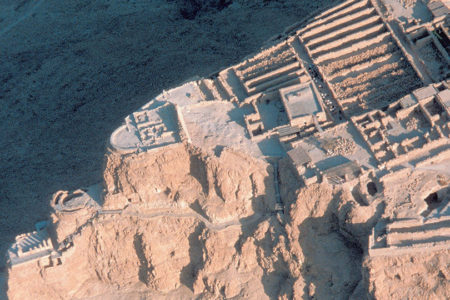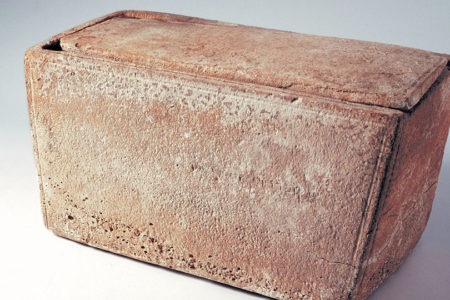I Am That I Am
Several years ago The Friends of Israel took a group of pastors, Christian laypeople, and staff members to the Embassy of Israel in Washington, D.C. The official who addressed the group provided an interesting, Hebrew slant on the Tetragrammaton. The Hebrew words commonly translated “I Am that I Am,” he said, can best be translated, “I shall be what it shall be.”
In Exodus 3:14, the Hebrew words for “I AM THAT I AM” are ’ehyeh ’asher ’ehyeh. According to John Hannah in The Bible Knowledge Commentary, ’ehyeh“is probably a wordplay on Yahweh,” God’s covenant name known as the Tetragrammaton, YHVH.1
Of all the names of God, the Tetragrammaton (Greek for “four letters”) is unique to Him alone. All nations had elohim (“gods”) whom they worshiped. All had adonai(“lords”) whom they called their masters. But only the descendants of Abraham, Isaac, and Jacob received the name YHVH, also known as Jehovah. He alone was their Elohim.
Faithful and Covenant-Keeping
In Exodus 6:3, God told Moses, “And I appeared unto Abraham, unto Isaac, and unto Jacob, by the name of God Almighty [Hebrew, El Shaddai], but by my name JEHOVAH [Hebrew, YHVH, vowel-pointed as Yehovah] was I not known.”
The Lord revealed to Moses that even though He had established a relationship with Abraham, Isaac, and Jacob; revealed His power and might to them; and established an unconditional covenant with them, He had never revealed to them His special name. His purpose in revealing it to Moses was clear: he 430 years of Jewish separation from the land of promise was about to end. God wanted His people to know that He remembered the covenant He had made with their father Abraham. So He revealed to Moses His unique identity to assure the Israelites that He would bring them into the land of their inheritance.
Bible scholar C. I. Scofield expounded on the covenant aspect of this unique name:
In this initial self-identification of God it is significant that the verb is in the first person; the Speaker names Himself, thus emphasizing His personal identification. It is the announcement of a present God, who has come to fulfill His covenant and keep His promise to the afflicted posterity of Abraham, Isaac, and Jacob.2
Jehovah is different from the other two primary names, Elohimand Adonai. Jehovah is personal. It can apply to only one deity—the God of the Hebrew people, the descendants of Abraham, Isaac, and Jacob. The revered Jewish sage and rabbi from the Middle Ages, Moses Maimonides, said with regard to this name,
All the names of God which occur in Scripture are derived from His works except one, and that is Jehovah; and this is called the plain name, because it teaches plainly and unequivocally of the substance of God.3
Nathan Stone, in his book on the names of God, quoted an unnamed commentator who stressed key aspects of God’s personality as revealed in His name:
In the name Jehovah the personality of the Supreme is distinctly expressed. It is everywhere a proper name denoting the person of God,and Him only…Elohim… denoting usually . . . the Supreme. The Hebrew may say the Elohim, the true God, in opposition to all false gods; but he never says the Jehovah, for Jehovah is the name of the true God only. He says again and again, my God or my Elohim, but never my Jehovah, for when he says my God he means Jehovah. He speaks of the God (Elohim) of Israel but never of the Jehovah of Israel, for there is no other Jehovah. He speaks of the living God, but never of the living Jehovah, for he cannot conceive of Jehovah as other than living.4
Forever Present and Self-Existent
Jehovah seems to be closely related to the Hebrew word havah, or hovah, which is the verb “to be.” In the English Bible (Old Testament only), Jehovah occurs 6,823 times and is always identified as LORD or GOD (all capitalized). In Exodus 3:13–14 God reveals his personal name to Moses:
And Moses said unto God, Behold, when I come unto the children of Israel, and shall say unto them, The God of your fathers hath sent me unto you; and they shall say to me, What is his name? what shall I say unto them? And God said unto Moses, I AM THAT I AM: and he said, Thus shalt thou say unto the children of Israel, I AM hath sent me unto you.
A possible explanation for the composition of the name Jehovah from the Hebrew might be yehi—he will be; hovi—being;hah yah—he was.5 Jehovah might also be understood as an acronym using parts of the same Hebrew words, making Ye-hov-ah, a name that states, “I will be (future) because I am (present) because I was (past).”
YHVH not only contains the aspects of past, present, and future but also declares that God exists in the eternal present because all three aspects are the same to Him. He is, and He is eternality itself. Thus He was telling Moses in Exodus 13:14, “I will be what it shall be. Whatever happens, I am it. I am your past, I am your present, I am your future.”
In addition to being related to the verb “to be,” this particular name is also closely related to the Hebrew word chavah, “to live,” or “life.”6 Jehovah is the self-existent one, the everliving God. In Isaiah 43:10–11 He states, “Before me there was no God formed, neither shall there be after me. I, even I, am the LORD [YHVH], and beside me there is no savior.”
The Lord clearly proclaims that He was the beginning of everything, and nothing existed before Him. He is the only uncaused cause. He is the source of everything that is.
Interestingly, no one really knows how to pronounce this most important of God’s names. Because it was considered too holy to utter, down through the ages YHVH was vowel-pointed with the vowels for Adonai. Today almost all Jewish people automatically say “Adonai” whenever they see this name in the Sidur(Jewish prayer book) or Scriptures. Some will simply say “Ha-Shem,” which means “the name.”
Such was not always the case prior to the destruction of the first Temple in 586 B.C. In those days the name was pronounced regularly, with its own vowels. This fact is clear from the Lachish Letters, written just prior to the Temple’s destruction. However, by the third century B.C., the pronunciation of YHVH was avoided altogether.7 This practice was begun by Jewish scholars who desired to do what Scripture commanded and honor the Lord’s great name. Interestingly, Hebrew has no letter w. So the correct Hebrew pronunciation could not be Yahweh or YHWH.
Far Different Than We
God Is Holy. Pronunciation aside, the name Jehovah reveals at least three unique characteristics of God. First, it confirms His holiness: “Speak unto all the congregation of the children of Israel, and say unto them, Ye shall be holy; for I, the LORD your God, am holy” (Lev. 19:2).
The word holy comes from the same Hebrew root as sanctify or sanctification. It means “unique, different, or separate.” God is unique, different, and separate; and He requires the same from those called by His name. God’s standard is absolute perfection. He can accept nothing less.
God Hates Sin. A second characteristic is His hatred of sin. When someone sins, that sin ultimately reaches Jehovah’s throne because we were made by Him and for Him. Therefore, we are answerable to Him (1 Pet. 4:5). Thus He has the right to judge sin and punish sinners. Our sinfulness affronts His holiness: “The soul that sinneth, it shall die” (Ezek. 18:20).
The apostle Paul confirmed God as Judge when he declared, “For the wrath of God is revealed from heaven against all ungodliness and unrighteousness of men” (Rom. 1:18). Paul continued this concept in Romans 6:23: “For the wages of sin is death.”
God’s holiness requires that He hate sin. He warned Adam that if he disobeyed, or sinned, he would die. This truth can be seen in Genesis 3. After they sinned, Adam and Eve still evidenced life but clearly were spiritually dead. They attempted to cover their shame with fig leaves, pass the blame for their sin to each other, and ultimately hide from God Himself. They were spiritually dead, which is the natural condition of every physical descendant of Adam and Eve since their sinful rebellion against a holy God.
God Loves Sinners. Mankind’s seemingly hopeless situation reveals a third characteristic of the name Jehovah: His love for sinners. Despite everything, God loves those who have rebelled against Him. After Adam and Eve fell, Jehovah demonstrated His love for His rebellious creation. He had the right to destroy them instantly. But Scripture says, “For Adam also and for his wife did the LORD [YHVH] God make coats of skins, and clothed them” (Gen. 3:21).
The name Jehovah may not have been revealed until Exodus, but it was clearly present as early as man’s fall. Many scholars believe it was here, in the shadow of man’s greatest failure, that the first manifestation of God’s loving grace is seen, as He instituted the sacrificial system as a means for sinful man to cover his sin.
Earlier Jehovah’s love is even clearer as the first possible reference of the gospel is declared: “And I will put enmity between thee and the woman, and between thy seed and her seed; he shall bruise thy head, and thou shalt bruise his heel” (Gen. 3:15). Here God reveals several significant truths. The woman’s seed (Messiah) will deliver a deathblow to the serpent’s head; but all the serpent will do is bruise, or crush, Messiah’s heel. A head blow to a serpent is fatal. Not so with a blow to the heel.
At the dawn of man’s rebellion, Jehovah was there, declaring His love for those He had created. Later, for their protection, Jehovah drove the rebellious couple from the garden so that they would not eat of the tree of life and remain forever in a lost and rebellious state. From then on, He continued to demonstrate His compassion and love for helpless humanity, despite His hatred of their everpresent sin.
The same grace was extended to Noah and his family and to Abraham, Isaac, and Jacob. None of them knew the name Jehovah, nor could they have understood fully all that it implied. But despite this void, Jehovah was there—the faithful, eternal, covenant-keeping, self-existent God who “commendeth his love toward us in that, while we were yet sinners, Christ died for us” (Rom. 5:8).
ENDNOTES
- John D. Hannah, The Bible Knowledge Commentary, John F. Walvoord and Roy B. Zuck, eds. (Wheaton, Ill.: Victor Books, 1985), 112.
- I. Scofield, ed., The New Scofield Study Bible (New York: Oxford University Press, 1967), 74 n.
- Nathan J. Stone, Names of God (Chicago: Moody Press, 1944), 15.
- Ibid., 15-16.
- “The Names of God” (n.p.: Philadelphia College of Bible, 1970), 3.
- Stone, 15.
- “YHWH,” EncyclopaediaJudaicaCD-ROM edition, 1997.








In HEBREW, how would l spell the exact phase “I Am that I Am” only can you tell me,Thank you l await your response thank you.
In this passage, I read it as some very important words and meaning that I never knew I want to know more and more about God word and his law, and I want to live in The Word for the rest of my life. I am a new believer I believe in God I love God and I know how great he is and I know that I am a true child of God.